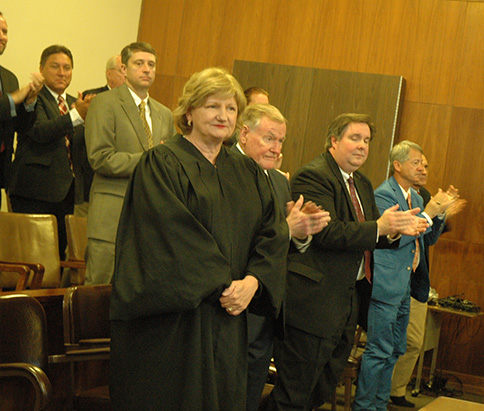
Seniors from three local schools not only got a first-hand Law Day lesson on how the judicial system works, but also became the second group to be addressed by the recently appointed Chief Justice of the Alabama Supreme Court, who delivered an inspirational and emotional message.
Twelve high schoolers from Escambia County High School, Escambia Academy and Atmore Christian School served on a jury that eventually convicted an East Brewton man of driving under the influence of a controlled substance, felony marijuana possession and several traffic violations. Two other ECHS students served as alternate jurors.
The jury in the criminal case against Leroy Dewitt Ackerman, who was represented by Brewton attorney Mike Perry, included, from Escambia County High School: Jade Alexandria Adams, Hannah Annette Martin, Justin Wayne Pearson, Devon Deantonn Robinson, and Eric Beranard McCaskill; from Escambia Academy: Carson Barnett, Gary Patrick Campbell, David Dobson, Paolo Gorme, and Trae Lee; and from Atmore Christian School: Mary Elizabeth Rolin and Micaiah Zundel. The alternate jurors, both from Escambia County High School, were Gabriel Alan Bennett and La’Jada Martazia Lee.
Prior to the court case, they heard addresses from Circuit Judge Bert W. Rice and several other court officials, including the keynote speaker, Chief Justice Lyn Stuart, an Atmore native who has been a part of the legal system for the past 37 years, including 29 years on the bench of several courts.
Atmore attorney Charles Godwin, who initiated the highly praised local Law Day observance 42 years ago, said the annual series of events was designed to instill a degree of civic responsibility in the youngsters who took part.
“It’s been a good program for the high school seniors,” he said. “The key is to instill rule of law, if I had to put it in just a few words. It is also to teach them about civic responsibility, about jury duty and voting. We’ve had some great speakers over the years, and today we have the Chief Justice of the Alabama Supreme Court. You can’t get any better than that, as far as our judicial system.”
Chief Justice Stuart told the assembled teens that, other than the annual convention of the state’s probate judges, she had not addressed a massed audience sincebeing appointed as the state’s top jurist.
She explained some aspects of this year’s Law Day theme, the 14th Amendment to the U.S. Constitution, also known as the due process or equal protection clause, and the uniqueness of the local Law Day program.
“I hope that today you will truly understand from your experience what due process is,” she said. “Do you know how unusual this program is? I’m not sure there’s another Law Day program like this in the state of Alabama. There’s probably only a handful in the United States, and I suspect that those are probably copycats of this program.”
She asked each youngster for his or her commitment to participation in the jury process and the voting process, then said she wanted to share something a little more personal with them.
The Chief Justice told of a Huntsville women’s club meeting at which she spoke while still an associate justice, at which a woman asked her at what point she knew she wanted to be a Supreme Court justice.
She was emotional as she continued, her voice breaking. She said the woman who asked the question obviously expected some stock answer, but got something quite the opposite.
“I told her, ‘never’, because who would have ever believed that a little girl from Atmore, Alabama, could become a justice on the Alabama Supreme Court,” said Stuart. “Yet I did. I want you to know that you can do anything that you want to. It doesn’t matter where you come from; it doesn’t matter who your family is, or whether you’re wealthy or poor, as long as you do your best. Ask God to help you, and you can do anything.”
She received a standing ovation from the gathering of attorneys, court officials, students, teachers and other visitors as she returned to her seat.
After Judge Rice thanked her for “coming home, so to speak,” Stuart left to return to Montgomery and the business of the court.
